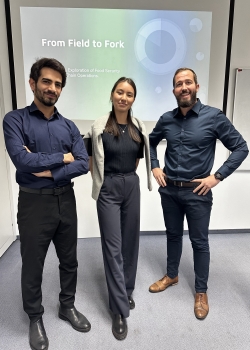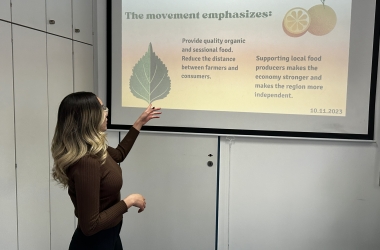Munich Project Week Addresses Food Security and the Food Supply Chain
Munich Project Week Addresses Food Security and the Food Supply Chain
Munich Project Week Addresses Food Security and the Food Supply Chain

Wittenborg Students Analyse Companies at the Forefront of Germany’s Supply Food Chain
During the project week concluding the October block, students at Wittenborg’s Munich study location had the opportunity to delve deeper into topics related to food security and food supply chains. Titled ‘From Field to Fork: An Investigative Exploration of Food Security and Supply Chain Operations’, the session took place from 3 to 10 November.
Working in groups of five, participants took on the role of investigative business journalists, embarking on an exploration of the intricacies of food production, distribution and consumption, with a specific focus on the German context. Over the course of their investigations, the students were required to consider the social and economic factors that contribute to food security, and how they manifest themselves in a developed country like Germany. Moreover, they had the opportunity to analyse companies that are at the forefront of shaping Germany's food supply chain.
According to the director of Wittenborg's Munich study location, Sascha Liebhardt, one of the activity’s main goals was to encourage participants to cultivate an appreciation for the interconnectedness of global systems and the importance of sustainable practices.
“As future businesswomen and businessmen, it is crucial for the
students to understand the complex systems that sustain us. Among these,
the food supply chain is one of the most critical, given its direct
impact on human health, economic stability and environmental
sustainability. It encompasses every step from the farm to the table,
including the production, processing, distribution, retail and
consumption of food. This knowledge is especially important in an era
marked by rapid globalisation, climate change and technological
advancement,” he highlighted.
Liebhardt added that the project
week was also aimed at developing competencies such as research skills,
analytical thinking and the ability to articulate complex ideas. “We
expect it to sharpen the students’ perception of the world and their
role in it as informed citizens and capable professionals,” he pointed
out.

Among other items, the students were required to deliver written group reports and presentations, an individual self-evaluation report and a pitch/poster presentation lasting five minutes. With a length of 3,000 words, the group report should include a definition of food security and its global context as well as an overview of food supply chains, their challenges and the German perspective.
Moreover, students were required to research the "farm to table” movement in Germany and analyse two companies involved in food supply chains, reporting on their practices and policies regarding sustainability, innovation and food security support. The assignment also included a reflection on the role of corporate responsibility in food supply chains and encouraged participants to propose ideas for improvement.
Bachelor’s student Brunilda Puci, from Albania, specialising in Economics & Management, said that she had a very nice experience during the project week and the topic was really interesting to work on. “What I liked the most was the harmony in our group and the humour that helped to maintain our positive energy throughout the presentation. Everyone did their part and the main thing I learned from this experience was that regardless of the topic and regardless of the people you will be working with, the purpose of teamwork is not to express your individual characteristics separately. Instead, you are part of a whole group, and you need synchrony and synergy to achieve success.”
WUP 10/12/2023
by Ulisses Sawczuk
©WUAS Press
587 words